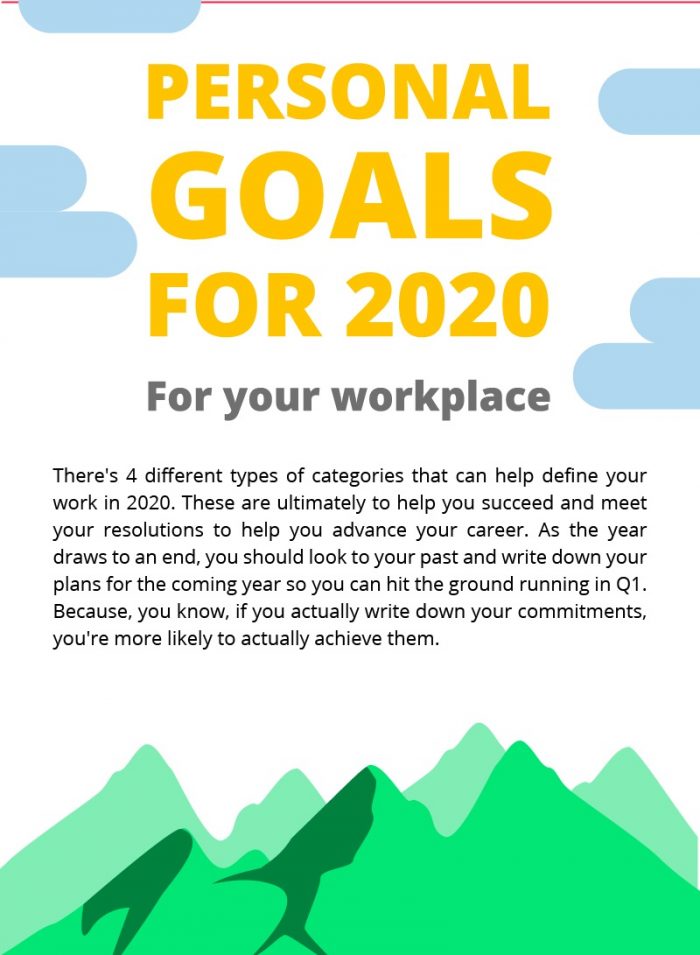All in all, there’s 4 different methods for setting personal goals for work based on the amount of time required to complete the goal. These can help you define what your personal work goals are for 2020 so you can move yourself forward to advance your career. As 2019 draws to a close, you should sit down and write up some feedback for yourself based on your performance for the year. By using these points as a guide, you can make educated choices regarding your goals and plans for 2020 to get you prepared for Q1. Basically, the big key is to write down and map out your key goals. So we’ve created an infographic and template to help you stay focused and identify your aspirations.

Lifetime Goals
Lifetime goals are big commitments that you are making for your entire life plan. These personal goals for work will interact the most with your personal goals outside the workplace. Overall, you should consider the timeframe of lifetime goals to be 10 years minimum with the potential to take a lifetime to complete.
For this purpose, some career examples for lifetime goals include:
- Getting an advanced degree
- Becoming a mentor for future professionals in your field
Long Term Goals
Long term goals have time limits and need to be accomplished before them. However, many projects and initiatives should drive these long term goals forward as long term goals should be aspirational. Specifically, the time you should spend on them is 5-10 years.
Some career examples for long term goals include:
- Gaining experience to advance to a leadership position/advanced role
- Change the focus of your career
Short Term Goals
Short term goals are, by definition, goals you want to accomplish during a shorter period of time. Ideally, these personal goals should be for a year or less. Generally, the lowest time limit for these is a month with standard units of measurement being: month, quarter, and year.
Some career examples for short term goals include:
- Improve communication with other teams
- Meet deadlines on all projects for x period of time
Stepping Stone Goals
Stepping stone goals are initiatives set for larger goals. Although, they are components of the other types of personal goals for work to help make larger goals achievable. Specifically, these goal deadlines can be as short as a week and must be measurable and adhere to strict deadlines.
Some career examples for stepping stone goals include:
- Set budget for the quarter
- Take a class to help you better understand corporate financial management
Personal Goal Setting Theory
Edwin A. Locke (pioneer of goal setting theory) and Gary P. Latham (professor of Organizational Effectiveness) conducted a study in 2006 regarding the future of goal setting theory. The goal was to assess the effectiveness of setting specific and difficult goals both at the personal and company level.
Specifically, the findings from this study emphasize the importance of how considering goals personally important has a significant effect on the success of these goals.
8 Studies for Optimal Goal Setting
If you would like to consult more theory on how to set your personal goals in 2020, the study by Edwin A. Locke and Gary P. Latham highlights 8 categories of goal setting theory that studies fall into. Afterwards, you can evaluate the research in any given area of goal setting. Specifically, the categories include:
- Goal Choice: Using sports as a reference, J.J. Donovan & K. Williams (2003) found the importance for goal reflection and flexibility between long term and short term goals among track and field athletes.
- Learning Goals: A study conducted by Gerard H. Seijts and Gary P. Latham (2001) stated that specific, aspirational goals don’t always lead to better performance. Instead, encouraging others through positive reinforcement can help individuals reach their goals.
- Framing: Anat Drach-Zahavy and Miriam Erez (2002) emphasize the importance of framing in their study. Framing difficult goals as challenges that lead to accomplishment and praise instead of as potential failures to be criticized increases performance for those goals.
- Affect: When looking at manager roles in Germany, a 3 year study by Bettina S. Wiese and Alexandra M. Freund found that failing personal goals, but succeeding in career related ones still increased motivation. In addition, being able to evaluate goal progress and achievement was essential to retaining happiness with goals.
- Group Goals: RP DeShon, et al. conducted a study in 2004 that served as the first in evaluating the success of personal goals and group goals at the same time. The result was that aligning goals to group goals had a positive effect. Thus, aligning your personal goals to larger goals is ideal in the workplace.
- Goals and Traits: A study by Gerard H. Seijts, et al. created 2 groups of personalities regarding goal setting. These are learning oriented and performance oriented. Those who are learning oriented choose tasks based on if they can obtain knowledge or skills. Those who are performance oriented avoid tasks where others may judge them for failure.
- Macro-Level Goals: Macro-level goal theory focuses on how important it is to align Company Goals to Team and Personal Goals. A study conducted by J. Robert Baum and Edwin A. Locke looked at this among entrepreneurs in 2004. Growth goals set at every level inspired passion for work and increased goal completion.
- Goals and Subconscious Priming: Subconscious priming is a method used to make sure goals add meaning to tasks and decisions, but aren’t constantly reinforced or at the forefront. These are ideal for long term goals. With short term goals, Alex Stajkovic and Edwin A. Locke conducted a study in 2006 that saw no large difference between conscious and subconscious goal setting in short term goals for proofreading.
